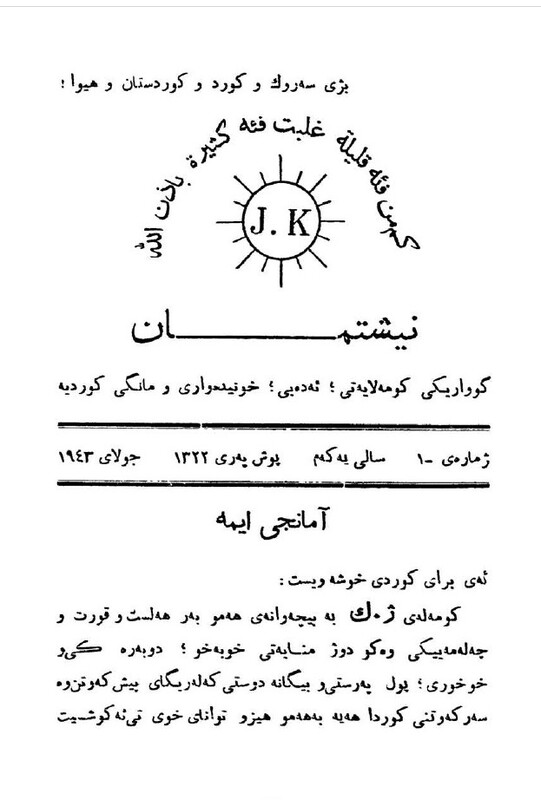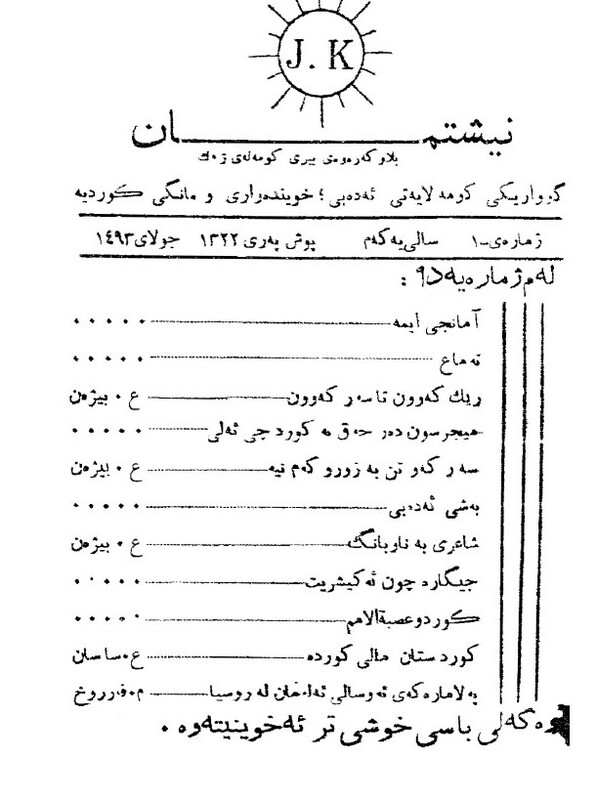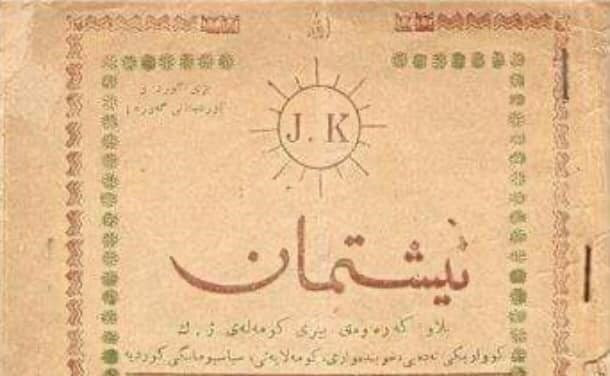Read the introduction of this article here
In the previous part, we mentioned that "JK Society" was the beginning of enlightening in the East part of Kurdistan, clearly at the political and organizational level. Establishing parties and deviation from the society's norms like tribes and the traditional relationships or the traditional formation of the society was in itself an innovation and a new phase in Kurdish society. However, we have already emphasized the cultural and intellectual activities and enlightening tasks of JK Society. One of the aspects that is known as a soft aspect of "JK Society" includes the "Nishtman Magazine" project.
Analyzing this magazine's articles, we can find out how much this magazine that was published eighty years ago was similar to the enlightening era in Europe at that time. One of the changes that happened in Europe at that time was social structure and social relationships transformation which were the foundation of Western countries' changes. Before this change happened, the society was ruled under the feudal and peasants' system. Feudalism had dominated all aspects of the European society. When the JK Society began its activities, just like the enlightening era, feudalism was at its peak. That is, the society was divided into two classes Lords and the lower class of peasants. The first thing that happened in Europe due to the events that had happened there was a transformation in the feudal and peasant system. The feudalism system was weakened first. The intellectuals, writers, and even those who were a part of the royal families began to make changes in society. They did so, in order to be able to create their nation-states. That is, another result of the enlightening era was transforming the political formation from monarchy and the religious based system of government to a secular nation-state system. Now, let us see how the content was classified in the first issue of "Nishtman Magazine".

The establishment of a nation-state and confronting the paths that resulted in the feudalism system in the society were both the results of constructing a secular society after the enlightening era. Both of these topics can be seen in the editorial of the first issue of Nishtman Magazine. The second article of this magazine was a debate between two people. This debate, known as the "Bayiz and Bapir" debates, which were later seen in "For Kurdistan" book of "Hazhar" (these parts of the magazine were clearly the work of Hazhar although they were not published by anybody's name) there are two men debating, i.e., Bayiz and Bapir, who are from the lower class of the society. They talk and discuss the feudalism system in which the people who do the work and produce the corps benefit from their efforts less than those who possess the lands. It means that the peasants cannot gain anything compared to their lords and in the end, this debate concludes that even the lords do not have anything, the peasants do have properties but their possessions belong to their lords. Here, it is said that the peasants do not have any right to possess what is in their homes in a satirical language. Even the wheat they have produced belongs to the lord, because whenever the lord orders he can take what the miserable peasants have produced. This shows that in the second part of the magazine, this unfair structure has dominated the Kurdish society.

The third topic of Nishtman Magazine is an article called "Unite in order to gain success" written by "A. Bijan" (this was Abdulrahman Zabihi's nickname). This article is also a short story written in a monologue narration talking about "one night in the seventeenth or eighteenth of the month, he had looked at the sky and had seen the stars and the moon. He had felt like a bird flying over Kurdistan's sky. He was flying over each and every beautiful thing in Kurdistan. From Van Lake to the Zagros Mountains, Urmia Lake, Mukeriyan, Ardalan, Kermashan, and Lorestan. In this story, the narrator goes on an imaginary trip to all parts of Kurdistan but wherever he goes, he sees foreigners' faces in Kurdistan. Here, the narrator sees himself facing two choices; one optimistic choice is that those whom he sees and the unpleasant scenery he sees are only gusts and temporary things in Kurdistan. It is good for a country to have so many gusts to make it develop. However, later, in the pessimistic and more realistic choice he replies that: no, these vague faces are Kurdistan occupiers who have misused Kurdish people's lack of trust in each other feeding from this land's blessings. Finally, a person or perhaps a voice tells him: "If you are sad about this, go to your people and tell them they need to be united in order to be successful." This article is a reminder of the opposition that the society needs to have with their occupiers. One of the phenomena we see is to confront tyranny and all the philosophers of the enlightening era were talking about it and saying how the society needs to oppose and resist the occupiers. How do people have to stop those who seize society's will and freedom?
The third article is an article by "Majorson" who was a European man living for a while in Kurdistan. His name was mentioned in Tahir Bag Jaff's book. He stayed among the Jaff tribe for a while. He was British. Tahir Bag Jaff mentions that he had stayed in their home as a simple worker just to learn about the Kurdish people's lifestyle and their language. Later, Majorson wrote a book about Kurdistan called "Mesopotamia and Kurdistan" which was published in London in 1913. In this article, one can see what was Majorson's opinion about Kurds. This article is also related to the previous ones. A man like Majorson had visited most regions of Kurdistan living in those regions for a while for example, Urfa, Mosul, and Halabja. Later, he mentions these distinct regions in his book. He says that Kurdistan is a country that cannot be dominated. He even mentions the defeat of the Greeks, Parthians, Ashkanids, and Romans in this country. The writers of Nishtman Magazine remind their people how someone like Majorson sees the greatness of Kurdistan. They remind them how they must protect their heritage and their land. Majorson even mentions that Kurds do not obey others. They cannot be defeated. They cannot be destroyed. They like to develop and to be civilized. They do not give up on their land. They do not like to be under the control of other nations that want to dominate them. The Kurds would like to protect their mountains, valleys, nation, and language. Once more, in this article by Majorson that is included in this magazine, they emphasize on Kurdish nations and the identity building elements. They tried to enhance Kurds' confidence in themselves and remind them of this high self-esteem. As it was mentioned, this article is related to the previous ones. This passage is written as an enlightening article for the readers.
To be continued…








